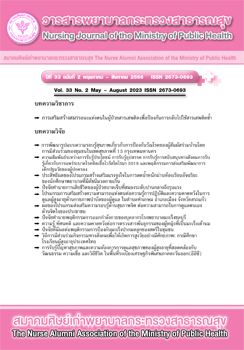Enhancement of self-efficacy in substance abuse patients to prevent relapse
Main Article Content
Abstract
Substance abuse has been a major health problem in Thailand for many years and continues to spread rapidly, affecting all occupations and age groups. However, patients who receive substance abuse treatment have a relatively high relapse rate, which is a significant problem. It has also been found that the most significant factors contributing to the relapse are personal factors, including drug cravings, a lack of motivation to stop the substance abuse, a lack of refusal skills, a lack of skills in dealing with high-risk substance abuse situations, and a lack of self-efficacy to stop substance abuse. Different types of therapies are currently available to prevent relapse. Enhancing self-efficacy for quitting substance addiction is an important approach used in substance abuse treatments. This article aimed to present knowledge about enhancing self-efficacy in patients with substance abuse for nurses and related individuals to apply in the care and monitoring of these patients, as well as to enhance self-efficacy that could stop substance abuse and prevent relapse, so that the patient can integrate harmoniously into society.
Article Details

This work is licensed under a Creative Commons Attribution-NonCommercial-NoDerivatives 4.0 International License.
บทความและรายงานวิจัยในวารสารพยาบาลกระทรวงสาธารณสุข เป็นความคิดเห็นของ ผู้เขียน มิใช่ของคณะผู้จัดทำ และมิใช่ความรับผิดชอบของสมาคมศิษย์เก่าพยาบาลกระทรวงสาธารณสุข ซึ่งสามารถนำไปอ้างอิงได้
References
Office of the Narcotics Control Board. Narcotics prevention in the community [Internet]. 2021 [cited 5 March 2023]. Available from: https://www.oncb.go.th/SitePages/ narcotics_effect.aspx
Office of Secretary of National Addiction treatment & Rehabilitation Committee, Ministry of Public Health [Internet].2023 [cited 13 June 2023]. Available from: https://antidrugnew.moph.go.th/Runtime/Runtime/Form/FrmReports/
Choosunthia W, Pinitsuntorn S. The impact of drug addiction on patients admitted to Thanyarak hospital, Udonthani: a case study. Community Health Development Quarterly Khon Kaen University 2017;5(3):523-33.(in Thai)
Sonhong N. Psychiatric comorbidity with substance use disorder patients at Songkhla Rajanagarindra psychiatric hospital. Journal of Somdet Chaopraya Institute of Psychiatry 2016;10(1):52-63.(in Thai)
Princess Mother National Institute on Drug Abuse Treatment. Therapist manual: Outpatient drug addiction treatment based on cognitive-behavioral therapy model [Internet]. 2012 [cited 5 March 2023]. Available from: https://udo.moph.go.th/Net_Narcotic/Manual/ 2%20Patient%20 workbook[1].pdf
Purahong G. Factors affecting relapsing drug addicted patients in Pathumthani province. Journal of Public Health Nursing 2018;32(2):23-40.(in Thai)
Chatu-hong S, Tan-sri-sa-kul S. Factors affecting relapse drug users with competency rehabilitation in Treatment compulsory system as a case study of office of probation, Roi-ed province. Chophayom Journal 2018;29(1):199-209.(in Thai)
Sirinual S, Suphunnakul P, Noosorn N, Wongsawad P. Factors affecting amphetamine relapse among drug addicts after treatment. Journal of Health Science 2016;10(1):39-45.(in Thai)
Bandura A. Social Foundation of Thought and Action: A Social Cognitive Theory. Englewood Cliffs, New Jersey: Rrentice-Hall;1986.
Marlatt GA, Gordon JR. Relapse prevention: Maintenance strategies in the treatment of addictive behaviors. New York: Guilford Press.1985.10
Chokrung P, Hengudomsub P, Vatanasin D, Pratoomsri W. The effect of program to enhance perceived drug abstinence self-efficacy on intention to drug abstinence among persons with amphetamine dependence. Journal of Boromarajonani College of Nursing, Bangkok 2016;32(3):37-50.(in Thai)
Bashirian S, Barati M, Mohammadi Y, Zarnagh HG, Bagheri S. Predictors of drug abuse relapse for Iranian addicted women: an application of social cognitive theory. Addictive Disorders & Their Treatment 2021;20(4):260-7. DOI: 10.1097/ADT.0000000000000249.
Puntong B, Kimsungnoen N. Effectiveness of self-efficacy and family support program on addiction behaviors in patients with amphetamine dependence in the national institute of drug abuse treatment. Journal of Health Science 2014;23(1):61-8.(in Thai)
Panya S. Study on the risk factors for repeated drug addiction among drug addiction patient at a drug addiction Rehabilitation Center in the Northeast. The 2st National Conference Ubon Ratchathani 2017;4.(in Thai)
Saengduenchai S, Nilban S, Jaipatum W, Konghom S, Jhinpracha Y, Singhtho T. The effect of cognitive behavior therapy on relapse prevention of methamphetamine dependence among in-patients. Nonthaburi:The Graphico Systems. 2014.(in Thai)
Department of Mental Health, Ministry of Public Health. Guidelines for the treatment and rehabilitation of alcohol/drug/substance dependence with psychotic symptoms and psychiatric comorbidities, department of mental health. Nonthaburi:Dee na doo media plus. 2021.(in Thai)
Pittayaruengnon W, Vivatthanaporn A. Problems of addiction treatment: a case study of public hospitals. Journal of Dhammasuksa Research 2022;5(2):94-102.(in Thai)
Panya S, Thajang S, Chapik N, Kanchanabut S, Mongkolsawad J. The relationship between personal factors, psychosocial factors, and environmental factors among repeated methamphetamine recurrence in Thanyarak hospital. Nursing Journal 2021;48(2):273-82.(in Thai)
Samputtanon J, Yunibhand J.Factors related to self-efficacy for amphetamine relapse prevention among male adolescents, government drug abuse treatment centers. Journal of Nursing and Health Care 2018;36(1):6-14.(in Thai)
Sirited P, Thammaseeha N. Self-efficacy theory and self-healthcare behavior of the elderly. Journal of The Royal Thai Army Nurses 2019;20(2):58-65.(in Thai)
Tongtub K, Uthis P. The effect of coping skills training in relapse prevention program on amphetamine abstinence self-efficacy of amphetamine users. The Journal of Psychiatric Nursing and Mental Health 2014;28(2):88-99.(in Thai)

